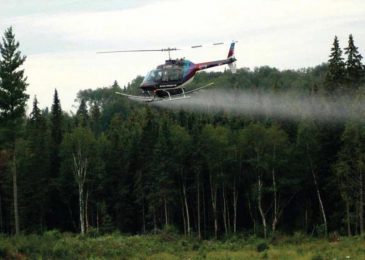KJIPUKTUK (Halifax) – The practice of applying glyphosate, a chemical herbicide used to eliminate hardwood from forests, is alive and well in Nova Scotia.
In 2010 the Department of Natural Resources (DNR) decided to stop spraying the herbicide on Crown Lands, and to also halt subsidies to private companies in support of their own herbicide programs.
However, substantial spraying programs on privately-held woodlands continue. And DNR does not rule out resuming the subsidies program sometime in the future.
Many Nova Scotians are concerned about glyphosate. The World Health Organization has classified the chemical as a probable human carcinogen. Critics also argue that spraying Nova Scotia’s forests with glyphosate negatively affects its ecological diversity and resilience.
Data published on the National Forestry Database website show that comparatively little spraying occurred on Crown Lands prior to the 2010 ban. Between 2001 and 2010 the herbicide was applied to 3,315 acres of Crown Lands.
During the same time 85,070 acres of privately held lands were treated with glyphosate. That’s the size of Point Pleasant Park 450 times over.
After 2010, when subsidies ended, things slowed down a bit. But not all that much. Between 2011 and 2014, the last year for which data is available, forestry companies treated 17,946 acres of private woodlands. Recently Northern Pulp submitted an application to spray woodland in Colchester and HRM
When asked point blank, DNR’s commitment to no longer subsidize companies in support of their spraying efforts seems to waver.
“The department is developing tools that help ensure that all forestry practices are science-based and aligned with an ecosystem-based management approach,” writes DNR spokesperson Brian Taylor.
“We will continue to assess the appropriateness of various forestry treatments, including herbicide, as we move toward landscape scale planning.”
\
See also: DNR drops acclaimed forestry certification program in Western Nova Scotia





Government-speak for “We’ll wait and see how much public uproar occurs over Northern Pulp’s recent request to spray glyphosate over Colchester and Halifax Counties”. This was made public in a small ad in a paper lots of good people are boycotting … The small ad was placed by Northern Pulp on July 29th – a long weekend when they were likely hoping people were away at their cottages by soon-to-become polluted lakes or asleep at the wheel and wouldn’t notice. “What harm can a little more glyphosate do?” they are likely saying. “We’ve been spraying this dope on Nova Scotia for years … Whaa?? We have the highest rates of Cancer you say? Nah that’s just tree-hugger talk. Got nothin to do with us! Bees and butterflies will die you say? So what? What are they worth in the big picture? Nah … Nobody cares about them. We’ll just throw in a few fancy tree-hugger words like “ecosystem” and “landscaping” Yeah that’ll change the water on the beans! Nobody minds a little landscaping with an ecosystem-based approach right? Hehehe! Yup spray away boys – Nova Scotia is open for business!!!”
i think lenore, while using sarcasm, makes some very valid points. points we would do well to consider. points we would do well to ask the politicians to make note of and address.
Thanks Lenore. I had no idea. Is there a petition we can sign?
While you make great points here Lenore, your own NDP set up Northern Pulp to do this with so many millions of dollars in corporate welfare…
Prayers for Nova Scotia….
Glyphosate = Cancer & tumors … dead bee’s, birds, animals etc…
#glyphosate #novascotia #cancer #tumors #disease #death #prayers
Pingback: Glyphosate spraying on Nova Scotia forests continues | alwaysaskfirst
Stop spraying, killing people, in exchange for industry profit, doesn’t make sense to me!
Where’s the petition? The department’s phone numbers? Publish and inundate.
As someone from Europe I am appalled to hear of this. This is insanity and it has to stop.
What the heck are they spraying weed killer on forests for?
The reason they spray is: “New Brunswick has been spraying herbicides since the 1970s when it first permitted pulp and paper companies to clearcut natural forest and replace it with artificial plantations. Spraying usually occurs one to two years after a plantation has been established. Herbicides are sprayed once or twice over plantations to poison hardwood trees and shrubs that compete with the planted softwood trees for space and nutrients. Spraying occurs each year in August and September and lasts about 40 days.”
Why are they doing this? What is the supposed benefit?
Why why why?
Monsanto are criminals and liars. They lied about PCBs and people died. People are still dying from PCBs. I have studied the literature on glyphosate and it seems very bad for the ecosystem as well as for the human superorganism. It probably affects the gut microbiomes of bees and humans and all other creatures. It does affect plant endophytic microbiota. Did you know that, government agents? Do you care at all?
And man’s stupidity continues. Not just the forest, but the animals, birds, insects. Stupidity
I am buoyed somewhat to read that the Environmental Ministry is looking into glyphosate before they approve the permit. For sure this is because of the stink ordinary people have made. Thanks Robert for this article which I came across on Facebook and have shared and seen it be shared beyond. Social media can be one powerful tool for information and for activism.
https://www.localxpress.ca/local-business/woodland-spraying-on-hold-for-now-374575
Thank you to Lenore Zann who has been very active in stopping this spraying. She is quoted extensively in the article.
“Three Colchester County mayors and MLA Lenore Zann met with Environment Minister Margaret Miller and department staff on Tuesday to discuss the proposed spray program and the dangers that it could pose.”
What happened at this meeting?
this not only kills the soft and hardwood trees but the fruits and berries that wildlife feeds on
I am very happy to have discovered the Nova Scitia Advocate which allows us to speak up for
life and health for all. Many thanks. All good comments from everyone here remind me of Chief Seattle’s words (1854), “Humankind has not woven the web of life, We are but one thread within it. Whatever we do to the web, we do to ourselves. All things are bound together, All things connect.”